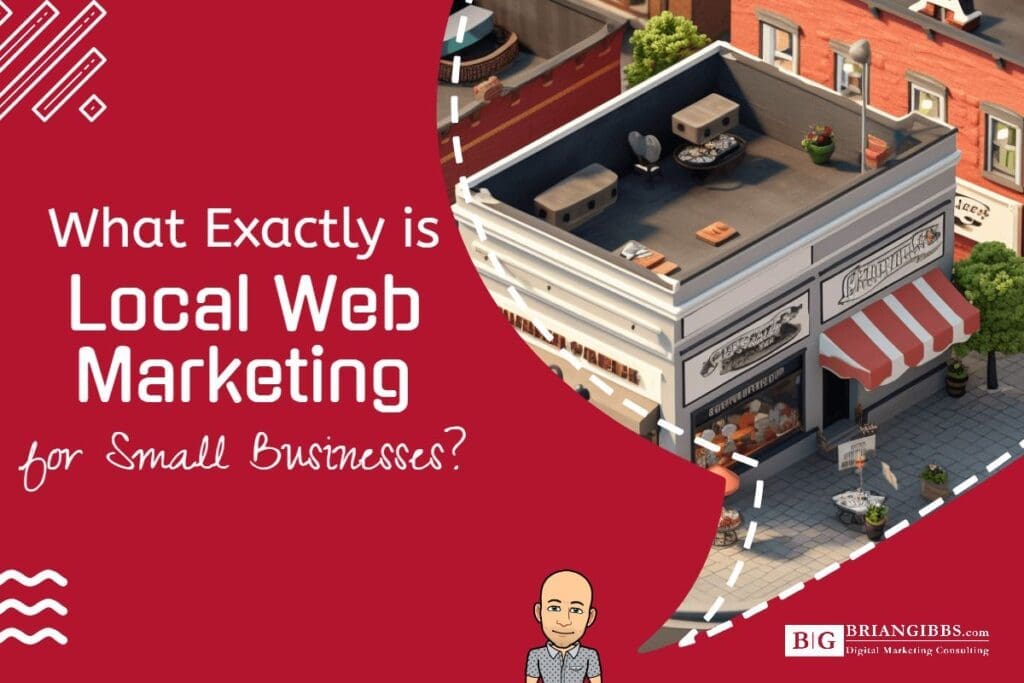What Exactly is Local Web Marketing for Small Businesses?
Are you a small business owner? Want to boost your local web presence? This article gives you handy tips for using local web marketing for small businesses to promote your business and reach more customers. Discover the main factors of a successful local web marketing strategy! Learn SEO best practices and content creation.

What Exactly is Local Web Marketing for Small Businesses?
Effective & Affordable Local Digital Marketing
Increase your brand visibility and draw in customers with local web marketing for small businesses. It’s cost-effective and easy to access due to digital advertising. Here are five key strategies to get you started:
- Search engine optimization (SEO). Enhance your rankings by optimizing for local keywords and location-specific content.
- Online directories. Get spotted by potential customers when they look for local services or products by listing your business on Google My Business, Yelp, and Yellow Pages.
- Social media marketing. Reach out to the local community, engage potential clients, and promote your services on Facebook, Instagram, and Twitter.
- Local content creation. Build authority in your niche and attract organic traffic by creating high-quality local content.
- Email marketing. Stay connected, send offers, and drive repeat business by building an email list of local customers.
Optimize your online presence with website design, content, and visuals. Track performance and adjust campaigns with analytics. Get started with these strategies and seriously reap the rewards of local web marketing!
The Importance of Local SEO
For small businesses, Local SEO is majorly important in the competitive online market. Through targeted geographic areas, companies can improve their online presence and attract nearby customers. Researching keywords, optimizing web pages, and listing in local directories are all key steps to success.
Local Search stands out as a unique approach to search engine optimization, setting it apart from the more traditional SEO practices.It focuses on location-based keywords and relevance. Small business owners must prioritize content related to their locality and optimize for mobile. To get the most out of Local SEO, here are a few helpful tips:
- Create a Google My Business profile to appear in local searches and maps.
- Use social media to engage with local communities, create credibility, and attract customers.
- Ask satisfied customers to leave positive reviews, boosting your online rep and influencing potential customers.
Local SEO is a powerful tool to increase visibility and get targeted visitors to your website. To succeed in this digital world, it’s a must for small business owners.
Increasing Local Brand Awareness
Small businesses can boost local brand awareness by utilizing various marketing channels:
- Utilize social media to engage with the local community.
- List your business on local directories to increase visibility.
- Run targeted ads to reach potential customers in your area.
- Partner with complementary businesses to cross-promote each other.
- Support community initiatives to show your commitment.
Additionally, consider implementing these strategies:
- Offer incentives or rewards programs to encourage loyalty.
- Showcase positive customer reviews and testimonials on digital platforms.
All of these efforts help build a strong reputation and establish a foundation for success.
Creating a Cost-Effective Marketing Strategy
Creating an effective marketing strategy is a must for small businesses. It helps reach their target audience, boost brand awareness, and generate leads. Here are some ideas to craft a cost-effective strategy:
- Utilize social media platforms such as Facebook, Instagram, and LinkedIn. Engage with potential customers through posts, stories, and ads.
- Focus on SEO techniques to improve visibility on search engines like Google. This involves optimizing keywords and meta descriptions and creating content that attracts organic traffic.
- Collaborate with influencers or bloggers in your industry. Their endorsement of products or services can significantly boost credibility and exposure.
- Use email marketing. Build a list of interested prospects and send out newsletters or promotional emails regularly.
- Host webinars or online events related to your industry. Position yourself as an expert and interact directly with potential customers.
- Monitor the performance of marketing efforts regularly. Analyze metrics such as website traffic, click-through rates, conversion rates, and customer feedback.
| Strategy | Description |
|---|---|
| Effective Marketing Strategy for Small Businesses | Creating an effective marketing strategy is a must for small businesses. It helps reach their target audience, boost brand awareness, and generate leads. |
| Social Media Engagement | Utilize platforms such as Facebook, Instagram, and LinkedIn. Engage with potential customers through posts, stories, and ads. |
| SEO Techniques | Focus on improving visibility on search engines like Google. This involves optimizing keywords, meta descriptions, and creating content that attracts organic traffic. |
| Collaboration with Influencers | Collaborate with influencers or bloggers in your industry. Their endorsement of products or services can boost credibility and exposure. |
| Email Marketing | Build a list of interested prospects and send out newsletters or promotional emails regularly. |
| Webinars and Online Events | Host webinars or online events related to your industry. Position yourself as an expert and interact directly with potential customers. |
| Performance Monitoring | Monitor the performance of marketing efforts regularly. Analyze metrics such as website traffic, click-through rates, conversion rates, and customer feedback. |
By using these strategies, small businesses can create a cost-effective marketing plan. With the right tactics in place, they can compete in today’s digital landscape. Building trust and credibility locally is essential for lasting connections in your neighborhood.
Building Trust and Credibility Locally
Small businesses need to build trust and credibility locally. They can do this by actively participating in local events and sponsorships, communicating transparently, and delivering quality products or services.
Focusing on customer satisfaction is a great way to gain trust amongst their local clientele. This means providing outstanding customer service, responding swiftly to any concerns, and being open and honest with their business practices.
Engaging with the local community is another way to gain credibility. This could be done by participating in charity initiatives or organizing events that benefit everyone. This shows that they care and creates a good impression of the brand.
Finally, having an authoritative online presence is crucial. This can be achieved through a well-designed website, active social media accounts, and positive online reviews.
Pro Tip: Consistency is key to building trust and credibility. Always deliver top-notch products and services to stay ahead of the competition in the online jungle.
Staying Ahead of the Competition
Small businesses must stay ahead of the competition to maintain a competitive edge. Local web marketing is a great strategy. Optimize websites with relevant keywords and local SEO techniques. Utilize social media to attract customers and foster loyalty. Invest in online ads for a targeted approach.
Monitor and analyze data to stay informed about market trends. Adjust your marketing efforts accordingly. Small businesses can make a big impact online. Drive local traffic like a boss!
Increasing Local Traffic
Competition has made it essential for small businesses to boost their local web traffic. Strategies such as optimizing keywords, creating profiles on local directories, and engaging with the community online must be implemented to improve visibility and attract potential customers. Additionally, offer local promotions and discounts to drive foot traffic to your store. Also, incorporate local SEO tactics like localized landing pages, Google My Business listing optimization, and obtaining backlinks from local websites.
To take your marketing efforts to the next level, consider investing in targeted online ads. Paid search ads, display banners, and social media ads will help spread your reach and increase website traffic. Sprinkle some local magic on your web marketing and watch those sales numbers soar!
Improving Conversion Rates with Localized Strategies
Boosting Conversion Rates with Localized Strategies is the goal. Here are 3 tips:
- Custom Content: Craft your website and marketing materials to fit the local crowd through local language, culture references, and preferences.
- Local SEO: Improve visibility on local search engines by using place-specific keywords, constructing localized land pages, and verifying business info.
- Develop trust through customer reviews: Showcase positive customer reviews and testimonials from local customers to build trust in your brand.
For an extra conversion rate increase, consider offering discounts or promotions specific to the location.
A business tried out localized strategies and saw a major rise in conversions. Their website’s local language and imagery helped them relate better to their target audience. This resulted in higher click-throughs and more conversions, which lifted their entire revenue.
By creating tailored tactics for different areas, businesses can upgrade conversion rates and maximize their online presence success.
Achieving Long-Lasting Rankings
If you want to achieve long-lasting rankings for your website, it is key to use effective strategies prioritizing quality and relevance. Here are 6 steps to help you:
- Do thorough keyword research to identify relevant terms and phrases that your target audience will use.
- Optimize content by adding these keywords naturally to your headlines, subheadings, and body paragraphs.
- Get quality backlinks from reputable websites in your industry to build credibility and up your site’s authority.
- Regularly update and refresh your website’s content to keep it fresh and valuable.
- Use social media platforms to interact with your audience and advertise your content, boosting visibility and driving traffic.
- Monitor and analyze your website’s performance with analytics tools, making adjustments to improve its ranking continually.
It is essential to remember that achieving long-lasting rankings is an ongoing process as search engine algorithms keep evolving.
Google was made popular in the late 1990s when Larry Page developed the PageRank algorithm during his Ph.D. at Stanford University. This algorithm changed the way search engines ranked web pages by considering factors such as the number of links pointing to a page, their quality, and relevance. This invention paved the way for long-lasting rankings in today’s competitive online landscape.
| Strategy | Description |
|---|---|
| Achieving Long-Lasting Rankings | To achieve long-lasting rankings for your website, prioritize quality and relevance. It’s an ongoing process as search engine algorithms evolve. |
| Keyword Research | Conduct thorough keyword research to identify terms and phrases that your target audience will use. |
| Content Optimization | Optimize content by naturally incorporating keywords into headlines, subheadings, and body paragraphs. |
| Backlinks | Obtain quality backlinks from reputable industry websites to enhance credibility and authority. |
| Content Refresh | Regularly update and refresh website content to maintain its relevance and value. |
| Social Media Engagement | Use social media platforms to engage with the audience and promote content, enhancing visibility and traffic. |
| Performance Monitoring | Monitor and analyze website performance using analytics tools and make necessary adjustments for continuous ranking improvement. |
| PageRank Algorithm | Developed by Larry Page in the late 1990s, this algorithm transformed search engine rankings by evaluating link quality and relevance. |
| Strategic Tactics for Small Businesses | Using strategies like these, small businesses can enhance their online visibility, becoming trusted industry authorities and achieving long-term search engine ranking success. |
| Community Engagement | Engaging with the local community ensures that locals are aware of and discuss your business, fostering a strong local presence. |
With strategic tactics like these, small businesses can become more visible online and establish themselves as dependable authorities in their industry, leading to long-term success in search engine rankings. Plus, it’s important to engage with your local community so people in the area know about your business and talk about it!
Engaging with the Local Community
It’s essential for small businesses to link up with their local community to be successful and have a big presence. Showing up at neighborhood events, helping out with causes, and forming relationships with people in the area can help create a faithful customer base and improve their reputation.
Here are some effective ideas to get involved:
- Go to nearby events: Attending or sponsoring local festivals, fundraisers, or sports tournaments can increase business visibility and show they care about the community.
- Work with other local firms: Joining forces with other local businesses can bring mutual benefits, like joint marketing or loyalty programs. This creates stronger bonds in the community and raises their customer base.
- Help local causes: Supporting charities and initiatives in line with the business values helps those in need and makes the brand look good. Whether it’s giving a portion of sales or organizing volunteer activities, it leaves a lasting effect.
- Give exclusive promos: Loyal and new customers will feel appreciated when they get discounts or promos only for the local community.
- Have a local online presence: Using social media and making location-specific content is a great way to communicate directly with the local audience. Get into conversations, share business updates, and answer customer queries or reviews quickly.
Also, figure out the specific needs of the local market and adjust products and services to meet them. This shows empathy and builds relationships based on trust. Ultimately, engaging with the local community lets small businesses expand naturally while making a positive difference to those they serve.
Small businesses can harness the power of local web marketing to elevate their brand and connect with their community. By implementing effective strategies, from SEO to social media engagement, businesses can enhance their online presence and foster genuine relationships with their local clientele. Prioritizing local engagement not only boosts visibility but also establishes trust and credibility. As the digital landscape continues to evolve, it’s imperative for small businesses to stay proactive, adapt, and seize the opportunities that local web marketing presents. Embrace these strategies, engage with your community, and watch your business thrive in the local market.



